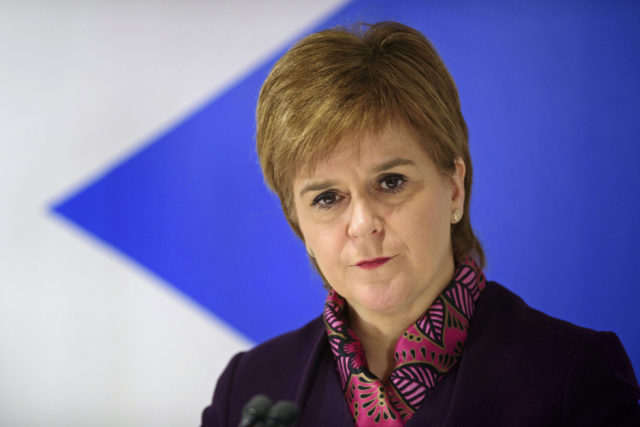
Theresa May has dismissed Scottish Government plans to bring in their own Brexit continuity bill as “unnecessary” despite Nicola Sturgeon insisting the controversial legislation is needed to “protect” devolution.
With talks between Edinburgh and London over whether the European Union (Withdrawal) Bill constitutes a “power grab” having reached a stalemate, SNP ministers introduced their own legislation on Tuesday.
The move has ramped up pressure between the two governments, amid fears Holyrood’s refusal to grant consent to the UK legislation could result in a constitutional crisis.
Meanwhile the Scottish Government has also come under attack from some in Holyrood as a result of the move, after Presiding Officer Ken Macintosh ruled the European Union (Legal Continuity) (Scotland) Bill to be outside of the Scottish Parliament’s legislative authority.
The Scottish First Minister said she still hoped a deal could be reached to change the UK Government’s legislation which would allow the devolved administrations in both Scotland and Wales to give it their approval.
But with Edinburgh and Cardiff so far unsatisfied by the changes proposed by the Conservatives at Westminster, Ms Sturgeon said the Bill – similar to one introduced at the Welsh Assembly – was an important measure.
The SNP leader said: “I hope we can strike a deal. The Scottish Government with our colleagues in the Welsh Government have been trying very hard to get to that position.
“We will continue to try, we remain open to an agreement that respects the principles of devolution in action, not just in rhetoric.
“But given the length of time these discussions have been ongoing without agreement being reached, we are in the position where we must take steps to protect the Scottish Parliament, and that’s why the Continuity Bill was introduced yesterday.
“If an agreement can be reached, that is a bill that can be withdrawn, but given the timescales we are working in now, it is important we took that step yesterday to protect the Scottish Parliament.”
The dispute centres on where devolved powers currently held by Brussels will end up after Brexit, with UK ministers insisting some of these must come to London so UK wide common frameworks can be set up.
“As First Minister I will not recommend to the Scottish Parliament that it agrees Westminster legislation that undermines devolution and takes powers away from the Scottish Parliament,” Ms Sturgeon added.
🔍 What is the Scottish EU Continuity Bill or the UK Withdrawal Bill?
Here's a quick explainer. #PMQs https://t.co/O1lHXt1ixr
— The SNP (@theSNP) February 28, 2018
SNP Westminster leader Ian Blackford raised the issue in the Houses of Commons, telling Mrs May it was “no surprise that the Scottish and Welsh governments are putting forward continuity bills to stop the power grab by Westminster”.
But Mrs May said that as her administration had given an “absolute commitment” to amending the EU Withdrawal Bill, there no need for the bills that have been brought forward.
“The proposals being put forward are unnecessary,” the Prime Minister said, adding the focus should be on reaching a deal over clause 11.
She said: “We are committed to protecting an enhancing out British Union of England, Scotland, Wales and Northern Ireland.
“The devolved administrations should be fully engaged in preparations for the UK’s exit.
“It’s our intention that the vast majority of the powers returning from Brussels will start off in Edinburgh, Cardiff and Belfast not in Whitehall.
“We will continue to talk to the devolved administrations because we also need to ensure that we maintain the single market of the United Kingdom.”

Meanwhile Ms Sturgeon was clear that Scottish ministers were “satisfied” about the Bill they had brought forward was in Holyrood’s legislative remit.
She said: “The Presiding Officer has expressed his opinion…we respectfully, and I mean that sincerely, disagree with that opinion.
“Scottish ministers are satisfied this Bill is within the legislative competence of the Parliament.
“This is an important piece of legislation that we need to introduce to protect the Scottish Parliament should that prove necessary.”


Comments: Our rules
We want our comments to be a lively and valuable part of our community - a place where readers can debate and engage with the most important local issues. The ability to comment on our stories is a privilege, not a right, however, and that privilege may be withdrawn if it is abused or misused.
Please report any comments that break our rules.
Read the rules here